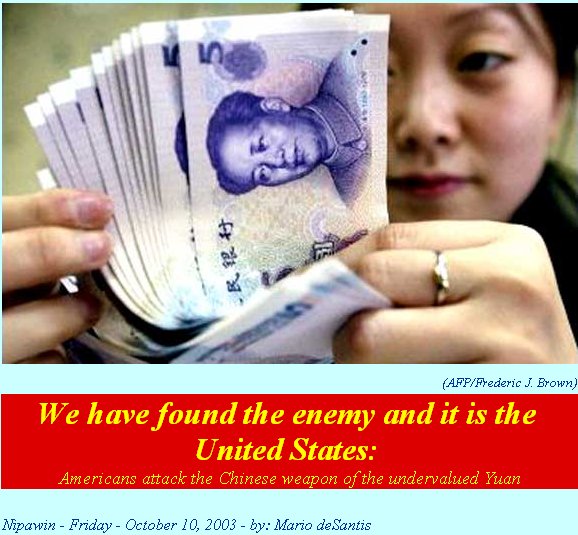Learning Stories
by
Mario deSantis
mariodesantis@hotmail.com
“I am a Canadian, free to speak without fear, free to worship in my own way, free to stand for what I think right, free to oppose what I believe wrong, and free to choose those who shall govern my country.” - -The Rt. Hon. John Diefenbaker, Canadian Bill of Rights, 1960
“The whole judicial system is at issue, it's worth more than one person.”--Serge Kujawa, Saskatchewan Crown Prosecutor, 1991
“The system is not more worth than one person's rights.”--Mario deSantis, 2002
Ensign Stories © Mario deSantis and Ensign
|
|
The world is getting more dangerous as the United States and Israel appear to have concerted plans for a sequential regime change in Syria. I also learn today that the United States gives $15,139,178 per day to the Israeli government and military and $205,479 to Palestinian non governmental organizations. The United States has an ongoing trade and budget deficit of some $1 trillion out of its total economy of some $10.5 trillion; it has a foreign debt of some $6 trillion and I wonder what kind of despicable courage for the Bush administration to blame China for its weapon of undervalued currency against the dollar. What is funny is that while China is experiencing a trade surplus with the United States in excess of $103 billion it is using its foreign reserves of some $346.5 billion to buy US treasuries bills to finance the United States deficit. If China was not buying US treasuries, or if it shifted its reserves to the Euro then interest rates would go up and the American economy could be going into a recession while at the same time, the dollar would further decline in value against major currencies. Morgan Stanley economist Andy Xie estimates that more than $1 trillion of US market capitalisation depends on inexpensive Chinese imports. In fact for every $1 in product value China receives from exports to the United States, that same product is resold in the American retail market at $4 to $5. It is also important to note that China is expected to experience an overall 2003 international trade surplus of roughly $10 billion while the United States is expected to experience an overall trade deficit of some $500 billion. We must also understand, contrary to the perception of American media, that the Chinese economy is more open than many other powerful countries and that its advertised communist dictatorial economic system is a fiction of the American Neo-Uber-Alles holed up inside the White House. Economist Nicholas Lardy, of the Washington, D.C., Institute for International Economics, has recently stated that "China's prices are market rather than state determined, most of its product markets are competitive and with the reduction of tariffs its economy is open." Another economist, Laurence Brahm, who lives in China, has stated in an interview he held with Asia Times "I do not think that China's state control over political and economic powers is any greater than, say, the US federal government's." Further, the understanding that China has an open economy is attested by the fact that China has become the largest Foreign Direct Investment recipient in the world in attracting $52.7 billion of the $143 billion invested worldwide in 2002. The economy of China appears to be overheating and there are indications it is growing at some 14% per year in this current month of October. Chinese unprecedented economic growth is accompanied by the fear of the collapse of the property boom in its major cities as the banking system is experiencing bad loans in the order of some 45%. The present Chinese currency, pegged at 8.3 yuan/dollar, is providing growth for China, stability for the eastern Asia economy, and it is helping at the same time the American economy.I agree with the position that China has taken and it should not let its currency float before correcting the problems of its financial and banking system. References Pertinent articles published in Ensign Wealth of economic articles collected by The China Study Group http://www.chinastudygroup.org/newspage.php Lobe, Jim Bush Stance on Syria Hit Shows Neo-Cons Still Hold Sway October 8, 2003 Inter Press Service, http://www.commondreams.org/headlines03/1008-05.htm If Americans Knew U.S. Assistance http://www.ifamericansknew.org/stats/usaid.html Reuters US gross external debt more than $6 trillion October 8, 2003 http://www.forbes.com/home_asia/newswire/2003/10/08/rtr1103708.html Crooks, Jack Politics, jobs and the yuan September 18, 2003 Asia Times, http://www.atimes.com/atimes/China/EI18Ad02.html Koretz, Gene China Isn't Hijacking Jobs September 26, 2003 Business Week, http://www.chinastudygroup.org/newsarchive.php?id=2767 Dolven, Ben and David Murphy Riding Out a Storm. The barrage of criticism from the United States about China's currency policies is at best misguided. October 5, 2003 FEER, http://www.chinastudygroup.org/newsarchive.php?id=2846 McGregor, Richard China in danger of overheating, say economists October 8, 2003 Financial Times, http://www.chinastudygroup.org/newsarchive.php?id=2864 Balfour, Frederik Another Big Reason China Won't Revalue. Already awash in bad loans, its Big Four banks could go under if depositors bolt October 2, 2003 Business Week, http://www.chinastudygroup.org/newsarchive.php?id=2829
|
